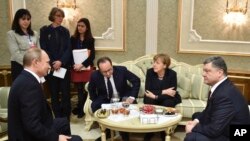Some scholars say that neither Minsk cease-fire agreements nor sanctions imposed on Russia are enough to end hostilities and stabilize Ukraine.
Executive Director of the McCain Institute at Arizona State University, Kurt Volker, a former U.S. ambassador to NATO said that the cease-fire in eastern Ukraine is definitely not working. People are still fighting, Volker said, and by definition there is not a cease-fire.
Even if it holds for a few days, he said, Russia is going to use that time to rearm and consolidate rebels in eastern Ukraine. The United States and European Union should also use the time to impose more sanctions on Russia, including President Putin and his family.
The U.S., EU and the International Monetary Fund should provide more financial support to Ukraine. In addition, Volker said, the West should provide arms to Ukraine to defend itself and establish its international borders.
“Putin is not a democratic leader in the way that Merkel, or Hollande, or President Obama are. He does not respond to the same incentives and the same concerns as democratic leaders would. Yes, the Russian economy is hurting, sanctions may have had some effects, certainly oil prices have had bigger effect, but these have not affected his decision making," said Volker.
"He continues to go on offensive in Ukraine, and by doing so he has maintained a very high popularity inside Russia, despite the economic hardship. And that is a way of demonstrating that there is the imperial narrative, the Greater Russia narrative that is working for him as a dictatorial leader, as opposed to any democratic leader would respond to," said Volker.
Wilson Center scholar, Kenneth Yalowitz, a former U.S. ambassador to Belarus and Georgia, said that parties in conflict have incompatible objectives. President Petro Poroshenko’s wants a diplomatic resolution to end the bleeding, Yalowitz said, while the other side is willing to use military force and keep pushing.
If the cease-fire is not sustainable, then defensive weaponry should be provided to Kyev, said Yalowitz.
“It will be a difficult step. The Russians will obviously react very strenuously, but this is a time, as a mentioned earlier, that the West is looking at diplomacy, is looking at sanctions, is looking at isolation. It has not looked yet at providing military equipment. I am afraid that if the cease-fire does collapse, it will probably require the provision of these defensive arms.
"The Ukrainians will never defeat the Russians militarily, but I think, it would be very important sign of Western resolve and commitment and political will that this salami tactic that is being employed in Ukraine cannot go on indefinitely," said Yalowitz.
Cory Welt of Elliott School at George Washington University said there is still some hope that the cease-fire will succeed. It is hard to say that the cease-fire is in the interest of Ukraine at this moment, Welt said. He said Ukraine needs peace so the nation can focus on needed reforms and not spend resources and lives on war.
Welt said it may become necessary to supply weapons to Ukraine. But the decision to send lethal aid should hinge not on the cease-fire but on whether Russia pushes beyond the line that currently exists.
“So, if there is continued fighting just on the line of contact, I do not think that will lead to much more than support that has already been given. But if Russia were to try to take, let say, Mariupol on the cost, or other territories that were previously occupied, then it would be very difficult for the U.S. administration to withstand the constant request to supply the Ukrainians with more lethal equipment, whether that would lead to further escalation of conflict is unknown, but there is the possibility of more sanctions to Russia," said Welt.
France and Germany pressed again Friday for respect for the cease-fire in eastern Ukraine and withdrawal of heavy weaponry.
Speaking to reporters after their meeting in Paris, French President Francois Hollande and German Chancellor Angela Merkel warned that sanctions could be imposed if the Minsk agreements to stabilize Ukraine are not fully implemented and the cease-fire is not observed.
VOA’s Georgian Service contributed to this report




